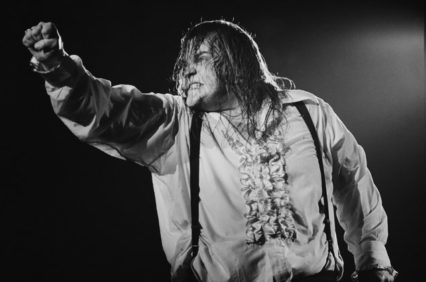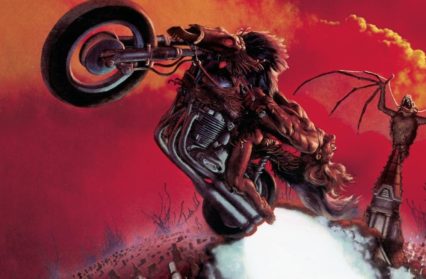In the latest in our series where we ask our writers to offer a case in the defence of the much-maligned, Max Ashworth offers an impassioned essay on Bat Out of Hell, the megalithic Meat Loaf album from the 1970s.

“Not Bat Out of Hell, again?” would be the sneery comment as someone passed my bedroom. And I hate to say it, but they’re right, you can have too much of a good thing; when something so meretricious and ubiquitous is played for the nth time that rebel voice in your head says no, you have now exceeded peak Meat, and it’s now time to forget about it again for a few years. I’ve been on a similar journey while writing this piece because I’ve always quietly liked Bat Out of Hell – more on the ‘quietly’ later. When writing about a film or an album I like to have that playing in the background, maybe dialogue or a lyric will give me inspiration or help further saturate me in that particular universe, and it’s safe to say while writing this I am in danger of approaching Peak Meat. And this from an obsessive who has seen Tremors at least 30 times, and who also abides by the rule of writing the first paragraph last.
So, where to start on one of rock’s most room-splitting and critic-proof albums?
Firstly, you should judge a book by its cover. It has been carefully created with the content and audience in mind; there will have been meetings, and someone high up signed it off. So you cannot complain, having accepted the comic book album cover of a hunk on an oversized motorcycle blazing to his death, or exploding Lazarus-like from the grave, while a hellish bat-shaped mausoleum and graveyard look on, can you? What the hell did you think was going to happen next? The album cover tells you exactly what to expect: a sensational and cartoonish adventure, a comically juvenile meditation on sex and death. Little Richard-meets-Wagner-meets-Guy N Smith, (who not incidentally wrote an equally lurid work, Bats Out of Hell).
Other than the melodramatic ballads, ‘Heaven Can Wait’ and ‘For Crying Out Loud’, the songs are musically interchangeable, overly produced and with the kitchen sink as the elephant in the room. It is an album that makes and then breaks your career, so enjoy the money while it lasts, because there’s no more coming. Like, where to go after Bat Out of Hell? Huge debut success is a curse. Only producer Todd Rundgren would enjoy a career without riding the wake of Bat Out of Hell. Composer Jim Steinman as a solo artist didn’t have the stage presence to get away with his theatrical songs – (on reviewing his post Bat attempts, I was embarrassed for him). Only Bat Out of Hell can get away with Steinman’s almost fairytale intro to ‘You Took the Words Right Out of My Mouth’: “On a hot summer night, would you offer your throat to the wolf with the red roses?” . . . “Yes” . . . “I bet you say that to all the boys.” Which, other than being mad as a box of frogs, is still utterly hilarious 30 of my earth years later, precisely because you don’t challenge it. The album has already set out its stalls with the stunningly bloated title track that doesn’t want to end, preparing you for the Dionysian excess to come.
So, what’s it all about? I will elaborate on the themes in due course. Maybe the album doesn’t have any meaning, just an excuse to let rip, wind the windows down, and have a laugh at how fun and ridiculous it all is. But I do like vocalist Ellen Foley’s idea that the album is a fever dream of the motorcyclist in the title track as he experiences past and future events while lying dying: “And the last thing I see is my heart still beating, and breaking out of my body and flying away, like a Bat Out of Hell.” I can’t tell you how much joy I get from quoting these lyrics; it’s like getting pissed at 15 and reading too much HP Lovecraft, the Godfather of all things mad and purple and OTT.
It’s a rare situation where I find lyrics printed on the sleeve unhelpful. I’m gonna go all Death of the Author here, but I think that too much information, even lyrics, can be deleterious. I don’t think we can or should know everything about a certain subject. DJ Mark Radcliffe surprised me when he said that he didn’t know the ‘meaning’ of any of his favourite songs. This is meant to somehow justify the fact that until I read the lyrics to ‘Bat Out of Hell’, I thought it was a suicide song, a blaze of glory and all that, but the lyric suggests an accident, “And I never see that sudden curve until it’s way too late.” I prefer my interpretation. We become so entrenched in our favourite songs that meaning gets swallowed up with style, sound and melody. (‘Virginia Plain’ by art students Roxy Music has a nice joke about this, an incomprehensible narrative composed of words for sound rather than meaning.)
That rare feat of catching lightning in a bottle, future Meat Loaf/Steinman collaborations without Todd Rundgren as producer, the triumvirate lost the glue that kept it all together. It would appear that 2 out of 3 ain’t good enough. Rundgren also worked with Springsteen and you can hear a lot of American rock channelling through. Not just rock, there is rhythm n blues and Motown, honky-tonk, even some Eagles-style harmonies, some Elvis. Why not? The more the merrier. It is Spectoresque in production, and musically technically brilliant, but not fussy, like other prog bands at the time.
Todd Rundgren is the hero of Bat Out of Hell. He provided backing vocals and played the guitar parts, he borrowed recording space and equipment, and he produced, engineered and mixed the lot without a guarantee of payment. And rather than quibble, he embraced the project, understood what the final result would sound like, and ran with it. And if you think Bat Out of Hell splits the room now, it didn’t even touch the sides when they pitched the idea to record labels of diminishing clout, eventually settling for Cleveland International/Epic Records. I guess it didn’t help that they failed to provide a demo tape, so pitching Bat Out of Hell with just Meat Loaf singing and Steinman on piano – how much were they smoking to think that that would fly?
Of the three singles released (‘You Took the Words Right Out of My Mouth’, ‘Two Out of Three Ain’t Bad’, ‘Paradise By The Dashboard Light’), any of the tracks could have been released as a single if they were of a radio-friendly length, and at that time singles and then albums were perceived as a gateway into a live performance, a great advert for a lucrative world tour. I need to give a shout out to ‘All Revved Up With No Place to Go’. In Bat Out of Hell, there’s always at least two registers of verse that alternate, and verses 2 and 4 and 6 have such a swagger and bounce to them that I defy anyone not to tap their foot, or strut down the street if listening to it on headphones. Each song is a mini-opera, a vignette, the album a collection of adolescent stories, containing a narrative, a beginning middle and an end. Jim Steinman didn’t want it to be “just another collection of songs” (odd that he lists The White Album as a musical influence).
Actually, the idea of making an album with Meat Loaf came late to Steinman – his background was in musical theatre, a place where he worked with Meat Loaf in a performance of ‘More Than You Deserve’ (1973). Steinman loved the idea of car crash songs (‘Tell Laura I Love Her’) to motorcycle crash songs (‘Leader of the Pack’) and with the title track, I agree with Steinman, he achieved his intention of writing the ultimate example of this early 60s sub-genre of crash songs.
Then I’m dying on the bottom of a pit in the blazing sun
Torn and twisted at the foot of a burning bike
And I think somebody somewhere must be tolling a bell.
“You really want a motorcycle on top of everything else?” So Rundgren picked up the nearest guitar, and with massive overdrive and right up close to the amp, created the revving motorcycle sound to everyone’s wide-eyed wonder.
After his spring-boarding performance in Hair alongside Tim Curry and Richard O’Brien, what followed was a remarkable moment of prescience. Meat Loaf, as Eddie, the ex-delivery boy, on a motorcycle, bursts through the walls of Frank N Furter’s vault in The Rocky Horror Picture Show (1975) and sings ‘Hot Patootie’ (Bless My Soul; I Really Love that Rock N Roll), with a 1950s insouciance and grandeur and rock n roll sensibility that would make his later live performances electric. I guess you could say that Bat Out of Hell and Rocky Horror and Hair exist under a similar kind of musical spectrum: camp as Christmas. And who doesn’t like Christmas?

A rising actor at the time, Meat Loaf (a childhood footballing nickname that stuck – real name Marvin Lee ‘ML’ Aday) has a striking, almost gothic-romantic stage presence, frilly shirts, long hair, the red hanky in his left hand, a sweaty behemoth of unreleased cathartic energy, and an intensity, insatiability, and a mesmeric and Svengali quality, kinda like a corpulent vampire on E, or Heathcliff throwing some shapes until the burgers arrive. There is also a great ‘beauty and the beast’ vibe with Meat Loaf duetting with Karla DeVito, who was aghast, but didn’t break character, when Meat Loaf put his tongue down her throat in the live performance of ‘Paradise By The Dashboard Light’, and gives her one hell of a goose. And to clear up the issue of who sang what, Ellen Foley sang on the record but had a full calendar and couldn’t tour. Probably just as well, Karla DeVito had more of a sassy stage presence when duetting with Meat, she just didn’t realise sexual harassment was part of the job.
Jim Steinman and Meat Loaf later fell out and both pursued other projects until a truce was brokered twelve years later to provide an environment to make Bat Out of Hell 2: Back Into Hell. Other than the five singles that featured in the top ten, and a solid Steinman production, to this listener, that album didn’t cohere as well as Bat Out of Hell, and to me, the sequel album was a belated cynical cash-in, but it did show that Meat Loaf was still a good draw in the 1990s. (Actually, since Bat Out of Hell, Meat Loaf has released 12 albums and been in over 50 films, which was news to me).
Casting Meat Loaf as Robert ‘Bob’ Paulson in the film adaptation of my generation’s bible: Fight Club (1999) was an inspired choice. Despite his on-stage shenanigans Meat Loaf is actually quite a gentle giant and, casting him as a former TV bodybuilder who messed with his pills and his hormones and is now emasculated, has female hormones and huge tits, and can only gain solace through fighting, Paulson provides the only real tenderness in an otherwise jolly angry film.
So why did Bat Out of Hell sell 30 million copies by 1980, but is now considered an embarrassment to your record collection? “Bat Out of Hell?” a friend would ask. “Really?” I’ve heard it said many times, and this is a whopping adumbration, that as we get older we become more right-wing, and therefore lose whatever sense of humour we might have had. Are we less likely to experience that nostalgic tingle when we revisit our youthful faves, analyse how our musical tastes have changed over the years? Consider the state of Britain at the end of the 70s where punk rightfully rebelled about the state of the nation and the establishments failing around us. If you wanted realism and wanted to at least become an aural rebel, then you chose punk, or maybe you were less explicit in taste and listened to Talking Heads or Television or Patti Smith instead. But if you wanted escapism and 45 minutes of fun and not thinking about reality, Bat Out of Hell was your man; or 30 million of you all, anyway.
When finally released, the album was under-promoted, thought of in the industry as damaged goods as it had been rejected by everyone else, and expectations were nil, there was almost no critical notice in music magazines and the six-day a week tours were punishing. Bat Out of Hell was always going to be all or nothing.
However, Australia and the UK really got into the album, and only a year later did America catch up. Bat Out of Hell usurped the Bee Gees from No1 In Australia and knocked the Saturday Night Fever soundtrack off the top in the UK.
This mostly nocturnal album (the title track happens under a ‘blazing sun’) feels like it exists in a different extreme reality to our own, a heightened experience, a bit like other room-splitters Van Der Graaf Generator, Yes, or Captain Beefheart’s Trout Mask Replica. There is an otherness to it, hard to create and define, and sometimes the actual lyrics can burst that otherworldly bubble, like a magician who then shows you how they did the trick. But like The Magus, a literary room-splitter, all the things some people find wrong with it are the very things I like about it: pompous, overwrought, contrived, pretentious, words that Bat Out of Hell haters would readily deploy, and have, and didn’t get the irony. Criticised for being melodramatic, overexcited, and unrestrained, I can hear Angela Carter’s typically sweary response to criticism of her purple prose, “And so fucking what?”
More so than usual, it is better to see a Meat Loaf live performance than sit at home with the CD – so as a compromise, you can see the musical, or you can find all the tracks recorded live on YouTube, and if by some miracle that you are reading this having never heard of the album before, I envy you. Hurry. Lovers of the album won’t need to have it defended and may be quite cross that I am; the other 50% might be searching for me on Twitter to politely disabuse me. I hope some people who said ‘meh’ at the time will find themselves in the right mood to give it another go and, fingers crossed, convert some haters, or provide a nudge to people that may have subsequently unconsciously forgotten about it.
Postscript
OK, so, the ‘quietly’ bit. Here comes the science. Postmodernism means never having to say that you are sorry. Intellectual aestheticism from the 60s onwards found a relaxed approach, but also a rigour (F.R. Leavis was suitably defenestrated, and instead we got into Bartes’ Mythologies and took great pleasure in Foucault teasing Sartre); Andy Warhol’s supermarket fetish of tins and soapboxes told us that even a supermarket can be a museum, high and low art can now be discussed equally. What I’m trying to say is that there is no such thing as an artistic guilty pleasure, never has been, and I was wrong to be quiet about Bat Out of Hell all those years; we can use the same tools to appraise Miley Cyrus as we did Joni Mitchell.
And seeing that as to most people being a teenager is a lot about rebellion, I doubt many millennials are raiding their parents’ record collection right now. I could listen to my rebellious music like the Butthole Surfers or Sonic Youth, and then mitigate that by playing some of my folks’ Kinks or Leonard Cohen records.
More importantly, despite its magnificence of high drama and extreme emotional core, Bat Out of Hell has a sense of humour. I’m not sure if the album would have worked otherwise; an unfortunate sense of self-importance or self-indulgence would have sunk it. And furthermore, it’s Rock n Roll, it’s not meant to be taken seriously. It’s supposed to be fun. And it’s here where the critics disagree with the punters.
Heroic in content and execution – as most pop music is 90% domestic – Bat Out of Hell deserves to be appreciated anew. But just don’t reach Peak Meat.
A ‘revamped’ version of Bat Out of Hell by Meat Loaf is available from here.
Max Ashworth is a regular contributor to Wales Arts Review.
For other articles included in this collection, go here.












